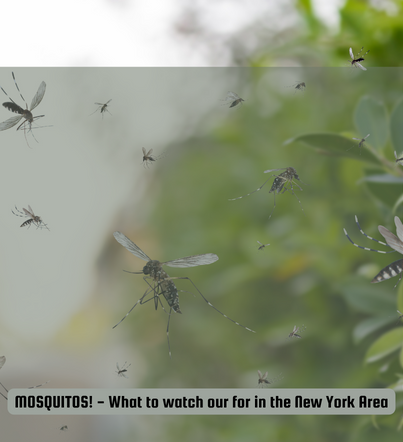Summer is approaching quickly, and in New York, that means that mosquito populations will be more active as the weather gets warmer. These annoying, buzzing insects can make it difficult to enjoy the outdoors or even commute comfortably from one place to another.
On top of being loud, bothersome pests, mosquitos can expose both humans and animals to serious illnesses. To reduce your risks of mosquito exposure, keep reading. This article will cover what you need to watch out for and how you can prevent mosquitos from buzzing around near your home.
Mosquito Health Risks
Mosquito bites, though irritating and uncomfortable, are only the beginning of the potential health risks these insects can introduce to the human population. When a mosquito bites a person, they make contact with that individual’s bloodstream, which may result in the transmission of several blood-borne diseases.
A few common, and potentially deadly health conditions that mosquitos spread to humans include the following:
- Malaria: Malaria is characterized by repeated high fevers and flu-like symptoms. In some cases, this disease can be fatal.
- Zika Virus: Zika virus usually produces mild to moderate symptoms like fever and skin rashes, but in serious cases, Zika virus can also lead to Guillain-Barré syndrome, which causes serious health complications.
- Chikungunya: This condition is usually contracted by travelers, but it exists in various parts of the world. Infection with this condition causes fevers, joint and muscle pain, rashes, and headaches. Babies, seniors, and people with existing health conditions are most at risk of contracting Chikungunya.
- Dengue Fever: This illness is most common in tropical environments, and in severe cases, it causes high fevers, body aches, nausea, and skin rashes.
- West Nile Virus: West Nile Virus causes high fevers like the above-mentioned illnesses, but it can also result in extreme weakness and vision loss. It’s typically more severe in older people.
- Yellow Fever: Yellow Fever causes moderate to severe jaundice and is accompanied by headaches, fatigue, nausea, vomiting, and muscle pain.
On top of posing significant risks to human health, mosquito bites can also be deadly to dogs and horses through the spread of canine heartworms, West Nile Virus, and Eastern Equine Encephalitis.
To protect yourself, your family, and your pets from mosquito-borne disease exposure in the New York area, it’s important to learn about the behaviors of these insects and practice effective mosquito control tactics.
Mosquito Habitats
There are roughly 200 species of mosquitos in the US alone, but three of these insect types tend to be more of a threat to New York residents. These three species include the Aedes, Anopheles, and Culex.
Aedes sollicitans mosquitos and Aedes albopictus mosquitos, also called salt marsh mosquitos and Asian tiger mosquitos (respectively), tend to populate more coastal areas. Their bites are quite painful and these insects feed aggressively during daytime hours. Fortunately, they don’t typically fly into buildings.
Anopheles mosquitos tend to lay eggs on the surface of permanent bodies of water. They’re more common in the lower part of the state, as they don’t do well in colder climates. This species is usually a carrier of malaria.
Culex mosquitos are among the most common in the New York area. They’re typical house mosquitos that tend to feed under cover of darkness.
Fortunately, most mosquito habitats are relatively similar from species to species. For example, most mosquitos lay their eggs in stagnant bodies of water. These bodies may include marshes, ditches, drains, puddles, pools, and swamp areas.
Mosquitos also commonly breed, nest, and grow in typically undisturbed areas like crumpled tarps, buckets, tires, plant pots, and holes in tree trunks.
Reducing the risk of mosquito exposure starts with eliminating potential breeding sites for these insects to take shelter in. To do so, you’ll want to:
- Dump out standing water when possible (such as the water collected in rain gutters)
- Remove potential shelters from your yard (old tires, broken buckets, plastic sheets)
- Change the water in bird baths, fountains, and plant saucers at least once a week
- If you’re unable to drain standing water, fill the area with dirt or sand
- Cover any openings to potential mosquito shelters (put lids on buckets, tape off holes in trees, and fill in window and door gaps)
Mosquito Exposure Control
In addition to keeping your yard free of debris and standing water, New York residents can reduce the risk of mosquito exposure further by taking precautions.
For example, if you plan to be outdoors in an area where mosquitos frequent, wear protective clothing like long sleeves, pants, and high socks. Tuck your shirt into your pants and your pants into your socks to keep mosquitos from crawling into your clothing.
If you have a baby or small child, cover carriers and strollers with netting to create a barrier between your child and disease-spreading insects.
For individuals who plan to camp or spend a significant amount of time outdoors, keep tent flaps zipped closed as often as possible. You may also want to wear hats with mosquito netting and use EPA-approved mosquito repellents.
However, the most effective prevention measure involves staying indoors whenever possible. When doing so, make sure your door and window screens are intact. You may also want to replace your outdoor lighting with “bug” lights. The more yellow-colored bulbs attract fewer mosquitos than white light, but they should not be considered a repellent.
Finally, it’s a good idea to remain informed and up to speed on any mosquito-related news or announcements published by the EPA or CDC. Getting ahead of a potential outbreak can make a world of difference when it comes to protecting your home and loved ones from mosquitos.
Whether you’ve noticed mosquitos flying around near your home or yard, or you want to get ahead of mosquito prevention for the season, Emerald can help. Emerald Tree & Shrub Care Company provides integrated mosquito management services. We use a combination of methods to implement mosquito control and protection. By understanding mosquito biology, life cycles, and behaviors, our team has developed the most effective defense mechanisms against these pests.Call Emerald to book a free appointment with one of our professional arborists and let us walk you through everything you need to know about mosquito control.










